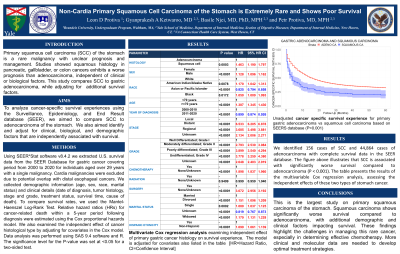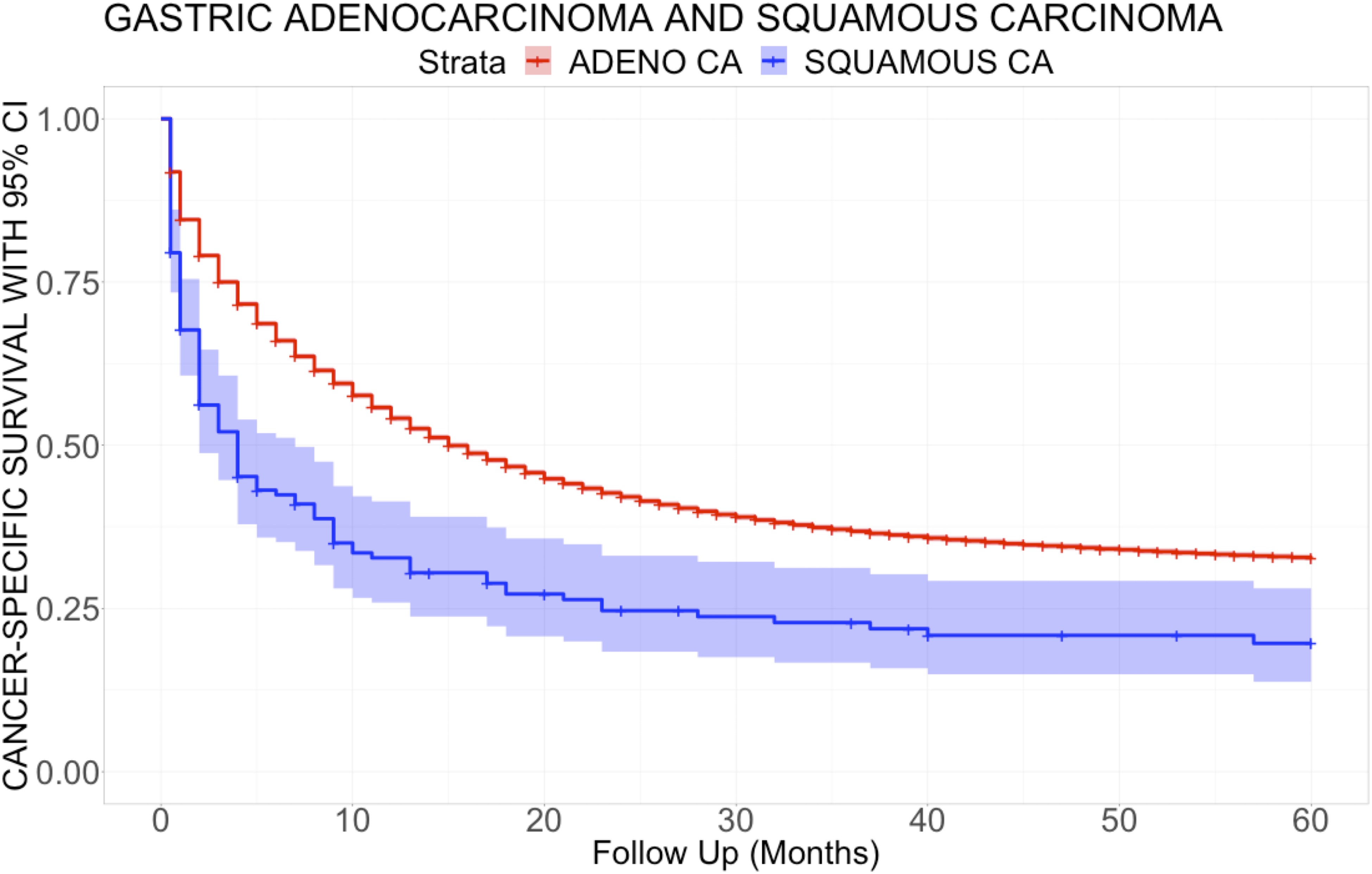Sunday Poster Session
Category: Stomach
P1609 - Non-Cardia Primary Squamous Cell Carcinoma of the Stomach Is Extremely Rare and Shows Poor Survival
Sunday, October 27, 2024
3:30 PM - 7:00 PM ET
Location: Exhibit Hall E

Has Audio
- LP
Leon Protiva, BS
Fairfield College Preparatory School
Fairfield, CT
Presenting Author(s)
Leon Protiva, BS1, Gyanprakash Ketwaroo, MD2, Basile Njei, MD3, Petr Protiva, MD, MPH4
1Fairfield College Preparatory School, Fairfield, CT; 2Yale Digestive Diseases and VA Connecticut Halthcare System, West Haven, CT; 3Yale University School of Medicine, New Haven, CT; 4Yale Digestive Diseases and VA Connecticut Healthcare System, West Haven, CT
Introduction: Primary squamous cell carcinoma (SCC) of the stomach is a rare subset of gastric malignancies with uncertain prognosis and management. Previous studies indicate that squamous histology in cancers of the pancreas, gallbladder, or colon is linked to worse prognosis compared to adenocarcinoma, irrespective of clinical and biological factors. This study aimed to compare SCC to gastric adenocarcinoma, considering additional survival factors
Methods: Using SEER*Stat software v8.4.2, we extracted U.S. survival data from the SEER Database for gastric cancer (2000-2020) for individuals over 29 years with a single malignancy, excluding cardia malignancies to avoid overlap with distal esophageal cancers. Collected data included demographics (age, sex, race, marital status) and clinical details (date of diagnosis, tumor histology, stage and grade, treatment status, survival time, cause of death). Survival rates were compared using the Mantel-Haenszel Log-Rank Test. Hazard ratios (HRs) for cancer-related death within 5 years of diagnosis were estimated with the Cox proportional hazards model, adjusting for covariates to examine the independent effect of cancer histology. Data analysis was performed using SAS 9.4 and R, with significance set at P< 0.05 for two-sided tests.
Results: From 45,020 cases of primary gastric cancer in the SEER database, 156 were SCC and 44,864 were adenocarcinoma, with complete survival data. Kaplan-Meier survival curves showed significantly worse survival for primary gastric SCC compared to adenocarcinoma (Figure 1, P< 0.001). Multivariate Cox regression analysis indicated that squamous histology was independently associated with worse survival. Other factors significantly linked to poor survival included male sex, higher tumor stage and grade, advanced age, absence of treatment (surgery or chemotherapy), and non-Hispanic ethnicity (Table).
Discussion: This is the largest study to date on primary squamous carcinoma of the stomach, revealing significantly poorer survival for SCC compared to adenocarcinoma. The study identified several demographic and clinical factors associated with survival, highlighting the challenges in managing this rare cancer and the need for effective chemotherapy strategies. Further clinical and molecular data are essential to establish optimal treatment strategies for primary squamous carcinoma of the stomach.

Note: The table for this abstract can be viewed in the ePoster Gallery section of the ACG 2024 ePoster Site or in The American Journal of Gastroenterology's abstract supplement issue, both of which will be available starting October 27, 2024.
Disclosures:
Leon Protiva, BS1, Gyanprakash Ketwaroo, MD2, Basile Njei, MD3, Petr Protiva, MD, MPH4. P1609 - Non-Cardia Primary Squamous Cell Carcinoma of the Stomach Is Extremely Rare and Shows Poor Survival, ACG 2024 Annual Scientific Meeting Abstracts. Philadelphia, PA: American College of Gastroenterology.
1Fairfield College Preparatory School, Fairfield, CT; 2Yale Digestive Diseases and VA Connecticut Halthcare System, West Haven, CT; 3Yale University School of Medicine, New Haven, CT; 4Yale Digestive Diseases and VA Connecticut Healthcare System, West Haven, CT
Introduction: Primary squamous cell carcinoma (SCC) of the stomach is a rare subset of gastric malignancies with uncertain prognosis and management. Previous studies indicate that squamous histology in cancers of the pancreas, gallbladder, or colon is linked to worse prognosis compared to adenocarcinoma, irrespective of clinical and biological factors. This study aimed to compare SCC to gastric adenocarcinoma, considering additional survival factors
Methods: Using SEER*Stat software v8.4.2, we extracted U.S. survival data from the SEER Database for gastric cancer (2000-2020) for individuals over 29 years with a single malignancy, excluding cardia malignancies to avoid overlap with distal esophageal cancers. Collected data included demographics (age, sex, race, marital status) and clinical details (date of diagnosis, tumor histology, stage and grade, treatment status, survival time, cause of death). Survival rates were compared using the Mantel-Haenszel Log-Rank Test. Hazard ratios (HRs) for cancer-related death within 5 years of diagnosis were estimated with the Cox proportional hazards model, adjusting for covariates to examine the independent effect of cancer histology. Data analysis was performed using SAS 9.4 and R, with significance set at P< 0.05 for two-sided tests.
Results: From 45,020 cases of primary gastric cancer in the SEER database, 156 were SCC and 44,864 were adenocarcinoma, with complete survival data. Kaplan-Meier survival curves showed significantly worse survival for primary gastric SCC compared to adenocarcinoma (Figure 1, P< 0.001). Multivariate Cox regression analysis indicated that squamous histology was independently associated with worse survival. Other factors significantly linked to poor survival included male sex, higher tumor stage and grade, advanced age, absence of treatment (surgery or chemotherapy), and non-Hispanic ethnicity (Table).
Discussion: This is the largest study to date on primary squamous carcinoma of the stomach, revealing significantly poorer survival for SCC compared to adenocarcinoma. The study identified several demographic and clinical factors associated with survival, highlighting the challenges in managing this rare cancer and the need for effective chemotherapy strategies. Further clinical and molecular data are essential to establish optimal treatment strategies for primary squamous carcinoma of the stomach.

Figure: FIGURE 1. Unadjusted cancer specific survival experience for primary gastric adenocarcinoma and squamous cell carcinoma based on SEERS database survival analysis of 156 cases of SCC and 44,864 cases of adenocarcinoma. Compared to adenocarcinoma
Note: The table for this abstract can be viewed in the ePoster Gallery section of the ACG 2024 ePoster Site or in The American Journal of Gastroenterology's abstract supplement issue, both of which will be available starting October 27, 2024.
Disclosures:
Leon Protiva indicated no relevant financial relationships.
Gyanprakash Ketwaroo indicated no relevant financial relationships.
Basile Njei indicated no relevant financial relationships.
Petr Protiva indicated no relevant financial relationships.
Leon Protiva, BS1, Gyanprakash Ketwaroo, MD2, Basile Njei, MD3, Petr Protiva, MD, MPH4. P1609 - Non-Cardia Primary Squamous Cell Carcinoma of the Stomach Is Extremely Rare and Shows Poor Survival, ACG 2024 Annual Scientific Meeting Abstracts. Philadelphia, PA: American College of Gastroenterology.
